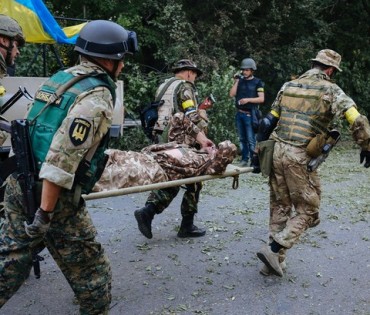Deputy Director of the IWP Kateryna Zarembo for EUObserverI would like to address the issue of Ukraine’s volunteer battalions (VBs) which are fighting in the unproclaimed war between Russia and Ukraine. We at IWP have been frequently approached by Western analysts and journalists with a request to clarify their legal premises, goal and mission. Unfortunately, so far the Western media have been dominated by the Russian propaganda rather than facts regarding the VBs.\
There are roughly 50 000 fighters taking part in the Antiterrorist operation (ATO) in the East. Out of them, 7000 are constituted by the VBs. While the purpose and legal base of the VBs may seem obscure to a foreign observer, inside Ukraine their formation was generally welcomed. Indeed, when the partial conscription was announced, many potential conscripts tried to avoid it. In contrast, the volunteer fighters did not need a special command to stand up and protect their motherland from the Russian aggression.
During the years of independence the Ukrainian Army was methodically destructed by the authorities. Few of them took any potential military threats seriously, hence the military budget decreased from year to year. In the last years Ukraine’s defence budget amounted to 1,1-1,2 % of GDP, which only covered 20-40% of the necessary minimum. The Army accounted for less than a half of these money. And even these resources were the object of corruption. Needless to say, the troops’ morale was low. The Army only attracted either those few who felt military to be their vocation or, usually, those poor who could not afford to pay a bribe in order to avoid the conscription.
In these circumstances people who volunteered to fight only evoked admiration and gratitude of Ukraine’s citizens. Indeed, the first National Guard battalions were at the frontline while the state was mobilizing what was left of the existing Army.
Who gives orders?
The legal premises of the VBs are indeed murky. However, the volunteer combatants are not outlaws. With several exceptions, they follow the command of the National Guard, the Ministry of Defence or the Ministry of Interior. Some of them – those under the Ministry of Defence – were mobilized through conscription, however, volunteers could also join. Others were formed based on the decision of Minister of Interior Arsen Avakov. Even those several VBs which are indeed under no jurisdiction of an official Ukrainian state body coordinate their actions with state military units in the war zone.
The truth is that there is no law on the VBs which would provide them with a legal status and clarify their mission once the war is over. Also, they receive no money from the state and subsist on private donations which naturally reduces their accountability to the state bodies.
Mission
Importantly, the VBs were essentially formed for a kind of a police mission in Donbas. When the conflict escalated and Russia openly invaded Ukraine, they ended up taking part in heavy warfare.
Image and ideology
Regardless of whether the VBs will take their place in Ukraine’s regular army once the war is over, they have created a totally new positive image of Ukraine’s military and boosted the sense of national pride and patriotism. While before 2014 speaking of Ukraine’s army provoked shame and sorrow, Ukrainians do so now with pride and empathy.
Supporting Ukraine’s military became one more nation-uniting factor. Many Ukrainians are engaged in volunteer fundraising activities, since in many cases state budget is incapable of providing the troops with basic necessities, let alone modern weapons. It is also extremely important that many volunteer combatants hail from the East of Ukraine, which refutes the allegation that Ukraine’s patriotism and nation-building efforts only come from its Western parts.
The fact that some (in fact, few) VBs include the members or are even led by people with ultranationalist views, is unfortunate – but only because this situation is a convenient target of Russian propaganda. The VBs have no ideology as such. The views of some VB members can be no means be amounted to the common ideology behind a battalion. The “Azov” battalion was mainly formed by people who were members of Avtomaidan*. Some observers claim that Andriy Biletskyi headed the battalion because of his ties to Arsen Avakov, others attribute it to his group’s effective fighting with separatists. However, his political views seem to have no connection with “Azov” military activity. The fact that he, alongside other VB commanders and fighters, made it to the list of the parliamentary candidates, only illustrates the popularity of the fighters with general public. Ironically, the parties hope to get extra votes for the courage of their candidates, not their political views.
Naturally, the situation with the VBs is not black and white. As an ad hoc grassroot movement with no clear selection procedure, it attracts different people – professionals and beginners, liberal and conservative, educated or not. The majority of them learn by doing. Undoubtedly, their actions must be governed and judged by the rule of law.
That said, their apprearance shows that the Ukrainian nation is more mature than anyone, the nation included, had thought it to be.




Comments theme
Comments themeComments themeComments themeComments themeComments themeComments themeComments themeComments themeComments themeComments themeComments themeComments themeComments themeComments themeComments themeComments themeComments themeComments themeComments themeComments.